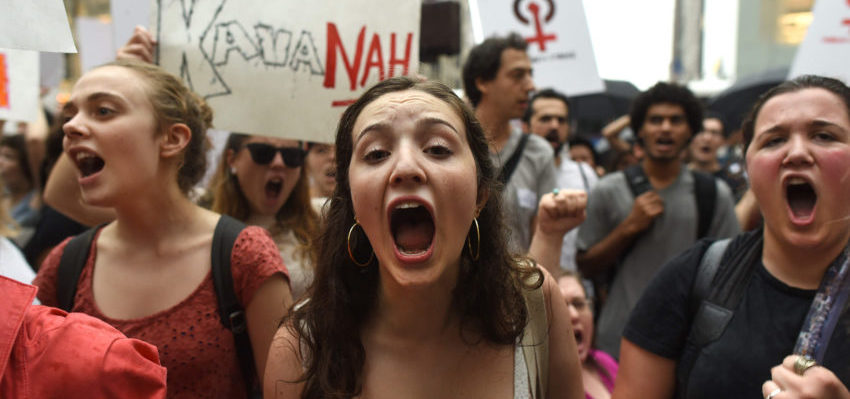
Dan O’Donnell on the Kavanaugh mob, the Capitol Chaos mob, and how to defeat the left’s intimidation tactics
October 10, 2018
Special Guest Perspective by Dan O’Donnell
It was a fitting start to Halloween season and a fitting end to one of the scariest spectacles in American political history: As Brett Kavanaugh was being sworn in as an Associate Justice, a crowd of protesters screamed outside and clawed like zombies at the doors of the Supreme Court building.
[bctt tweet=”The zombie-like #Kavanaugh protests are nothing new. Protesters dressed like actual zombies harassed Gov. @ScottWalker for weeks during the debate over Act 10 seven years ago.” username=”MacIverWisc”]
Just hours earlier, the Senate vote to confirm Kavanaugh was interrupted several times by banshee-like screams from the gallery. Senator Susan Collins (R-ME), who had announced in a passionate speech the previous day that she would be the deciding “aye” vote, faced an angry mob outside of her office.
The contrast couldn’t have been clearer, as one side did the business of government in a Constitutional Republic on the Senate floor and then in the chambers of the Supreme Court, while the other side amassed an angry mob to intimidate them.
Forget about the witch hunt against Kavanaugh himself; the most lasting impact of the battle over his confirmation may well be the resounding crescendo of years of what may be properly termed “Zombie Politics”—the weaponization of hordes of angry (and largely mindless) demonstrators.
This is, of course, nothing new. Protesters dressed like actual zombies harassed Wisconsin Governor Scott Walker for weeks during the debate over Act 10 seven years ago, when mobs organized by public employee unions tried to bully Republicans into submission on collective bargaining reform.
The literal zombie protesters, though, served as a sort of tipping point in the Act 10 fight. When they disrupted a Special Olympics ceremony by staging a “die-in” in Madison in June of 2011, even their fellow liberal activists thought they had gone too far.
“That was not associated with anything that [we were] doing,” United Council of University of Wisconsin Students spokesman Matt Guidry told The Milwaukee Journal Sentinel at the time. “That doesn’t make us look that good.”
For the next year, it served as a rallying cry for Wisconsin’s conservatives, who were so disgusted with how far out of line the opposition to Walker had grown that they organized and mobilized not in zombie mobs but in get-out-the vote efforts that delivered Walker a stunning recall election victory from which the Wisconsin Democratic Party has never really recovered.
[bctt tweet=”It seems like the left’s walking dead have already brought out the inner Rick Grimes in some of their former allies within the Republican Party, like Sens. Lindsey Graham and Susan Collins.” username=”MacIverWisc”]
Therein lies the path forward from the Kavanaugh fight, and it seems like the left’s walking dead have already brought out the inner Rick Grimes in some of their former allies within the Republican Party. Lindsey Graham (R-SC) angrily denounced the manner in which his Democratic colleagues destroyed Kavanaugh’s reputation, while Collins made the most thorough, compelling case for his confirmation; a brilliant closing argument on the Senate floor that was briefly interrupted, naturally, by the howling mob in the gallery.
As intimidating as the near-constant presence of that mob may have seemed, however, it appears to have served only to solidify the opposition to it.
And not just among elected Republicans, either. Voters, too, have moved toward the GOP as the attacks against Kavanaugh intensified. Two different polls showed Democrats’ advantage on the generic congressional ballot cut in half over the past month while an IBD/TIPP survey released late last week put the lead at just 2 percent for Democrats, down from 11 percent in early September.
Just as significantly, 92 percent of self-identified Republicans now approve of the GOP Congress, up from 86 percent last month. Though this may seem like a small jump, it indicates that conservative voters are engaged and appreciative of their party’s efforts to beat back the mob in a way that they weren’t before that mob threatened Kavanaugh’s confirmation.
[bctt tweet=”With less than four weeks until Election Day, the zombies are clawing at the door. Will the American people let them in?” username=”MacIverWisc”]
Recent history also suggests that the voting public is generally put off by “Zombie Politics.” Two years after Walker won his recall, Democrats tried to capitalize on the #BlackLivesMatter movement and steer it to the ballot box. When the protests devolved into riots in the late summer and early fall of 2014, however, voters turned away from Democrats and Republicans recaptured the Senate for the first time in eight years.
In 2016, after a long summer of angry demonstrations outside of nearly every Trump campaign event (including one in Chicago that grew so violent that a scheduled rally had to be cancelled), voters delivered to Trump quite possibly the single biggest political upset in the nation’s history.
While it is far too simplistic to suggest that reaction to the liberal mob was the main driver of those Republican wins, it is impossible to ignore as a contributing factor. Now, after a long summer of that mob hounding Trump Administration officials in restaurants, the American people have seen the damage that can be inflicted on both the political process and the very function of government itself.
With less than four weeks until Election Day, the zombies are clawing at the door. Will the American people let them in?